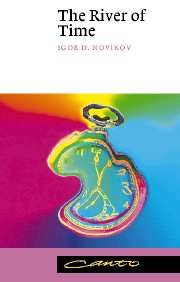Book contents
- Frontmatter
- Contents
- Preface to the Russian edition
- Preface to the English edition
- 1 Origins of thinking about time
- 2 Science of time is born
- 3 Light
- 4 The pace of time can be slowed down!
- 5 Time machine
- 6 Time, space and gravitation
- 7 Holes in space and time
- 8 Energy extracted from black holes
- 9 Towards the sources of the river of time
- 10 Journey to unusual depths
- 11 Grand Unification
- 12 Sources
- 13 What produces the flow of time and why in a single direction only?
- 14 Against the flow
- 15 Can we change the past?
- Conclusion
- Name index
- Subject index
4 - The pace of time can be slowed down!
Published online by Cambridge University Press: 04 May 2010
- Frontmatter
- Contents
- Preface to the Russian edition
- Preface to the English edition
- 1 Origins of thinking about time
- 2 Science of time is born
- 3 Light
- 4 The pace of time can be slowed down!
- 5 Time machine
- 6 Time, space and gravitation
- 7 Holes in space and time
- 8 Energy extracted from black holes
- 9 Towards the sources of the river of time
- 10 Journey to unusual depths
- 11 Grand Unification
- 12 Sources
- 13 What produces the flow of time and why in a single direction only?
- 14 Against the flow
- 15 Can we change the past?
- Conclusion
- Name index
- Subject index
Summary
Here unfolds the story of the momentous achievements of science in the 20th century. I would say that the most impressive discovery was made at the very beginning of the century by Albert Einstein when he created relativity theory. He showed that there does not exist any ‘absolute time’, no unified unchangeable river of time which impartially carries all events occurring in the Universe.
Academician A. Alexandrov of the Academy of Sciences of the USSR wrote: ‘Einstein's greatest discovery which became the cornerstone of relativity theory and a turning point in the general physical and philosophical interpretation of space and time was the revelation that nature knows no absolute time.’
Evidently, time behaves as a river with constant, unchangeable flowrate only in the habitual conditions of relatively slow motions and not very high interaction energies. Its properties are very different under very unconventional conditions! We will discuss this later in great detail.
The discovery of the relative nature of time is contained in relativity theory that Einstein created in 1905. An enormous number of books have been written about Einstein, definitely more than about any other physicist. Several factors explain this. I will quote the opinions of several well–known scientists who knew Einstein personally, and also Einstein himself; these sources may help, to some extent, to reconstruct the image of this personality and to understand the causes of his immense popularity.
- Type
- Chapter
- Information
- The River of Time , pp. 47 - 68Publisher: Cambridge University PressPrint publication year: 2001



